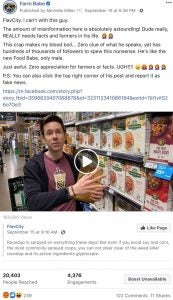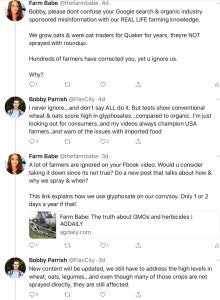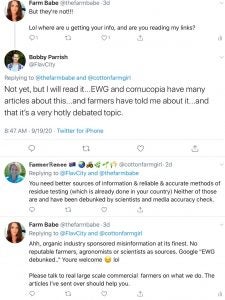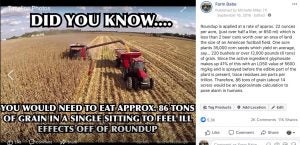Social media sensation and Chicago-based chef and cookbook author Bobby Parrish has over 1.1 million YouTube subscribers, 426,000 Instagram fans, and 609,000 followers on Facebook, where his videos regularly reach millions of people. The problem? He spreads tons of misinformation.
Here is a screenshot of just one of his videos on Facebook, but a bulk of his views are on YouTube.

Pardon my frustration but … “Roundup is sprayed on everything these days!,” he says? No, that’s not at all how it works. Spraying Roundup on a majority of crops would kill them, which isn’t exactly good for business. He goes on and on, with some of the worst information I’ve ever seen perpetuated about American agriculture.
After I shared this video with my followers, he received hundreds of comments from upset farmers correcting him. He’s engaged with me on different social media platforms a couple of times, but it seems like he’s not changing his tune and is still dead-set on lying to the public.
I have even offered to go to Chicago to meet with him, and I’ve offered him sponsored farm tour travel. So many growers have reached out to try to help him understand how food is actually produced on a large scale. Do you think he’ll change his tune? I’m not sure, but now that my frustration is out of the way, here is an open letter to him:
Dear Bobby,
In our previous Twitter conversations, you had said that you are looking out for consumers and champion USA farmers. Thank you for that! It looks like right off the bat, we have something in common.


I have watched plenty of your videos and content, and I must say, as a USA farmer, I’m sure my fellow farmers would agree with me that we feel you’re not championing for us much at all. We wish you would connect with us, come on out to our farms, and learn from us. Are you willing to do that?
The information you sometimes present about what we do — the whys and hows — is just plain not accurate. Particularly when it comes to chemical use in agriculture and food labeling.
First, let’s talk GMOs. The whole reason why most GMOs are invented is to help farmers and the planet. After hundreds of millions of dollars and decades worth of research and development, GMO seeds come to fruition in order for us to use fewer and/or safer pesticides and/or less tillage, which is good for soil health. (And no, Roundup is not in seeds!) GMOs can also save crops from disease, allow farmers to grow more crop on less land, among so much more — the list goes on. When as many as 95 percent of commodity-crop growers choose to use GMO seeds, please learn from us about why that is. We all care about the planet, but farmers care especially when it’s our livelihood and multiple generations of our family that work the land.
I know this information may come as a shock to you. Heck, it did for me to when I moved to a commercial-scale farm in Iowa in 2014. You see, you and I have a lot in common, and I myself was once a Chicago-based, organic only, anti-GMO activist.
You may wonder why you hear bad things about non-organic farming. And the answer is simple: Food corporations and organic-industry-sponsored lobbying groups spend BIG BUCKS to spread misinformation in order to charge more money and further their agenda and sales. If you do a Google search for “EWG debunked,” for example, you’ll find that they are not at all a credible source of information. Same with Cornucopia and other anti-GMO groups who are sponsored by groups like Whole Foods or Stonyfield Organic, as two examples.
Did you know brands like Chipotle and Stonyfield have banned and silenced hundreds of farmers, scientists, and other experts who have tried to correct their misinformation? Here is the link to just one group of those experts. You have to ask why? If you have credible info, you should be able to back it up confidently and without blocking everyone who challenges you.
You haven’t blocked me, and I don’t know anyone who you’ve banned. You’ve responded to a couple of my tweets, which tells me you might be open to learning more — and I thank you for that. But I strongly encourage you to talk to real commercial farmers about farming. Get information from university research and extension, from credible unbiased scientists (the U.S. land-grant system is an amazing resource). Talk to agronomists, and maybe even check out www.gmoanswers.com. I would be very honored and happy to put you in touch with farmers and experts who do this for a living, and not food companies or activist groups with an agenda and who don’t actually grow our food.
I am a farmer, public speaker, writer, and influencer on all things farming, and my niche is mythbusting. Two of the biggest myths I love busting is chemical use and livestock care. I can assure you that many food labels are misleading or not well regulated. Words like “GMO,” “Non GMO” or “organic” tell you absolutely nothing in terms of livestock care or chemical use; these are marketing buzzwords. Organic can use pesticides! If you learn from and connect with a variety of larger-scale commercial growers, we will show you how much we care about the soil, our health, the planet, and ultimately YOU and other consumers.
We are a very tightly regulated industry. In order to use many of the approved chemicals, our crops are tested and we must hold certifications, licenses, do ongoing trainings, etc. We don’t want to use pesticides if we don’t have to, (they’re time consuming and expensive!), but sometimes it is necessary to protect our plants from disease, insect infestation, and weeds that steal our crop’s nutrients. Everyone has to eat! Farmers are barely 1 percent of the population, and oftentimes we feel very under appreciated. Through your platform, you could do a great job lifting us up! But instead we feel you tear us down.
We have been growing GMO crops on our farm since their inception in the late 1990s. We also have earned numerous awards for “farmers of the year” in soil and water conservation. We have been commercial oat growers and grain buyers for decades as a family-farm operation.
When you tell others that grains test positive for “high levels of glyphosate,” and this is 100 percent false. (Check your source and their methodology for “testing!” The “high levels” statement has been debunked repeated by independent research.) Oats are not sprayed with glyphosate in the U.S., and it’s extremely rare in wheat (less than 3 percent of acreage). In our corn and soy, we spray glyphosate sometimes, but it’s only one or two days a year at the very beginning of the growing season.

If you really care about consumers and farmers, you’ll share the fact that any farmer can do a great job regardless of marketing label and that farmers deserve praise for providing one of the most safe and abundant food supplies in the world. I have sent links over for you to read in the past, but here they are again below as references to learn more. I know this is a lot of information, but I beg of you … please examine the other side of the argument you’re making and take the time to read the articles and hyperlinks within this letter (most of which I’ve written).
- Wheat and glyphosate facts: Click here.
- GMOs and herbicide use: Click here.
- No, glyphosate is not in your food! The flawed methodology and myths: Click here.
Please realize that whether a farm is organic, grass-fed, GMO corn fed, conventional … every farm deserves respect, and every system has pros and cons, but it’s all consistently proven to be safe. I fear that the fear-based marketing messages that you sometimes share can certainly hinder scientific progress or negatively impact families who maybe don’t have a large budget for food. Thank you so much for your time in learning and reading this, and please do not hesitate to contact me on my cell or email, which can be found on my website, www.thefarmbabe.com.
Thank you.
Sincerely,
Michelle Miller “The Farm Babe”
Michelle Miller, the Farm Babe, is an Iowa-based farmer, public speaker, and writer, who lives and works with her boyfriend on their farm, which consists of row crops, beef cattle, and sheep. She believes education is key in bridging the gap between farmers and consumers.



